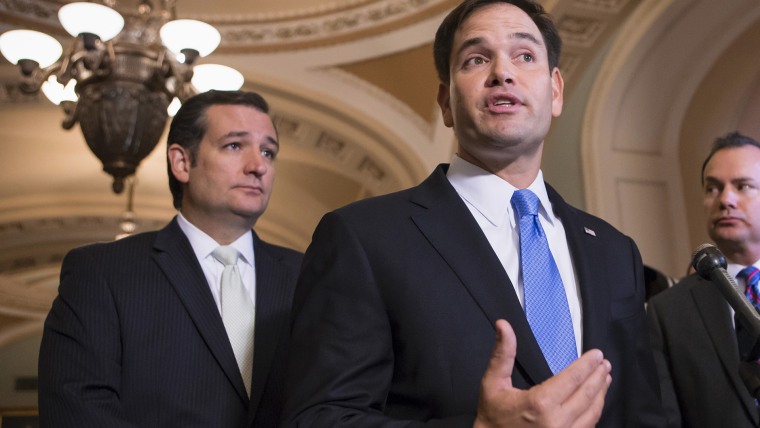In early December 2007, about a month before the Iowa caucuses, former New York City Mayor Rudy Giuliani was still a top-tier candidate for the Republican presidential nomination. In some surveys, he was even the frontrunner. There was, however, a small problem with his candidacy: as actual voting drew closer, rank-and-file Republicans were just starting to learn about his positions on the issues.
His rivals subtly let GOP voters know, "By the way, Giuliani is pro-choice and supports marriage equality," and the mayor's candidacy collapsed soon after. Republicans thought they loved Giuliani, right up until they realized how much they disagreed with him on a major issue the GOP base took seriously.
Eight years later, to put it mildly, it'd be a stretch to equate Giuliani with Sen. Marco Rubio (R-Fla.) -- the former held several centrist positions, while the latter is extremely conservative on almost everything. But like Giuliani, Rubio has been at odds with his party over an issue the GOP base considers important, and like Giuliani, the Florida senator's rivals are starting to remind Republicans about this as the early nominating contests draw close.
The issue, of course, is Rubio's partnership with liberal Democrats on an immigration reform package that conservatives consider "amnesty." Sen. Rand Paul (R-Ky.), for example, said over the weekend, "It was a Rubio-Schumer bill. So, he does have to explain it."
As MSNBC's Benjy Sarlin reported last night, Sen. Ted Cruz (R-Texas), who's been waiting for the clear Republican establishment candidate to emerge, is hitting even harder.
“It is not complicated that on the seminal fight over amnesty in Congress, the Gang of Eight bill that was the brainchild of Chuck Schumer and Barack Obama, that would have granted amnesty to 12 million people here illegally, that I stood with the American people and led the fight to defeat it in the United States Congress,” Cruz said. He added that nominating a clear “amnesty” opponent was essential to Republican chances for victory, since conservatives won’t turn out for a candidate they view as weak on the issue.
“In my view, if Republicans nominate for president a candidate who supports amnesty," Cruz added, 'we will have given up one of the major distinctions with Hillary Clinton and we will lose the general election -- that is a path to losing."
In fairness to Rubio, it's worth emphasizing that he dramatically flip-flopped on the immigration issue, betrayed his former allies, and now rejects the very proposals he helped write just two years ago. Maybe that will satisfy Republican voters, maybe not.
But his Texas rival is starting to draw the contrast with greater clarity: Rubio partnered with the left on immigration, while Cruz battled the left on immigration.
Keep in mind, this isn't just some peripheral issue for many conservatives. A far-right, hard-line stance on immigration is for the Republican base what support for Social Security is for many Democrats -- a stance the base simply expects as a commitment to party orthodoxy.
Imagine a Democrat writing a Social Security privatization bill, endorsed by the Bush/Cheney White House in 2005, and then running for the Democratic presidential nomination in 2008, insisting all the while that he has no use for the legislation he helped author.
For his part, Rubio seems to understand the potency of the landmine. The Washington Post's Greg Sargent noted yesterday that the Floridian sat down for some post-debate interviews and carefully dodged key questions about immigration details. (Rubio also falsely said "the American people" opposed his bipartisan compromise, which is ridiculously untrue.)
Is it a sustainable posture? Cruz doesn't seem to think so.
As for Rubio's current position on the policy that used to be his signature issue, Francis Wilkinson had a smart piece yesterday, explaining, "Marco Rubio has a three-step plan on illegal immigration. Trouble is, it's a three-step plan for Rubio to gain the Republican nomination, not to address illegal immigration."
Is it too late for Rubio's rivals? Isn't it likely that Republicans know about Rubio's immigration record, and they've decided his work with Democrats isn't a deal-breaker?
It's certainly possible, but I also remember plenty of commentary eight years ago about how the GOP base valued Giuliani's electability and national-security arguments so much, they were willing to overlook the areas of disagreement.
